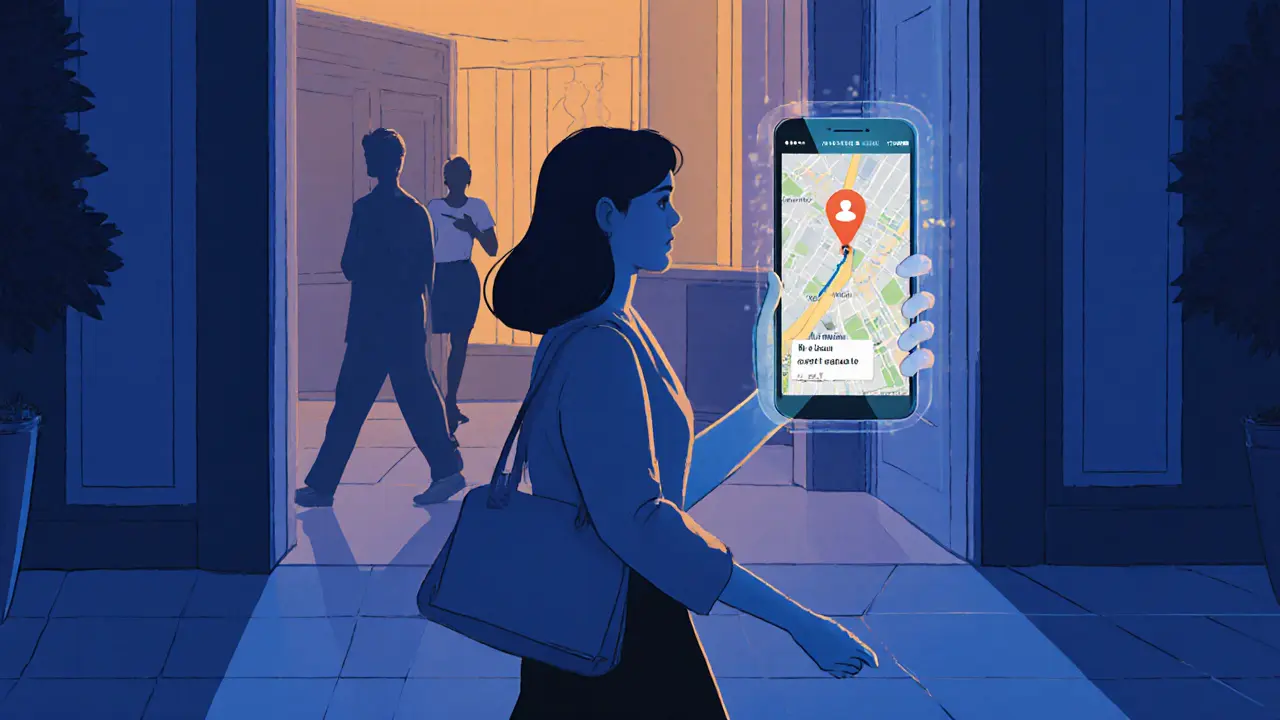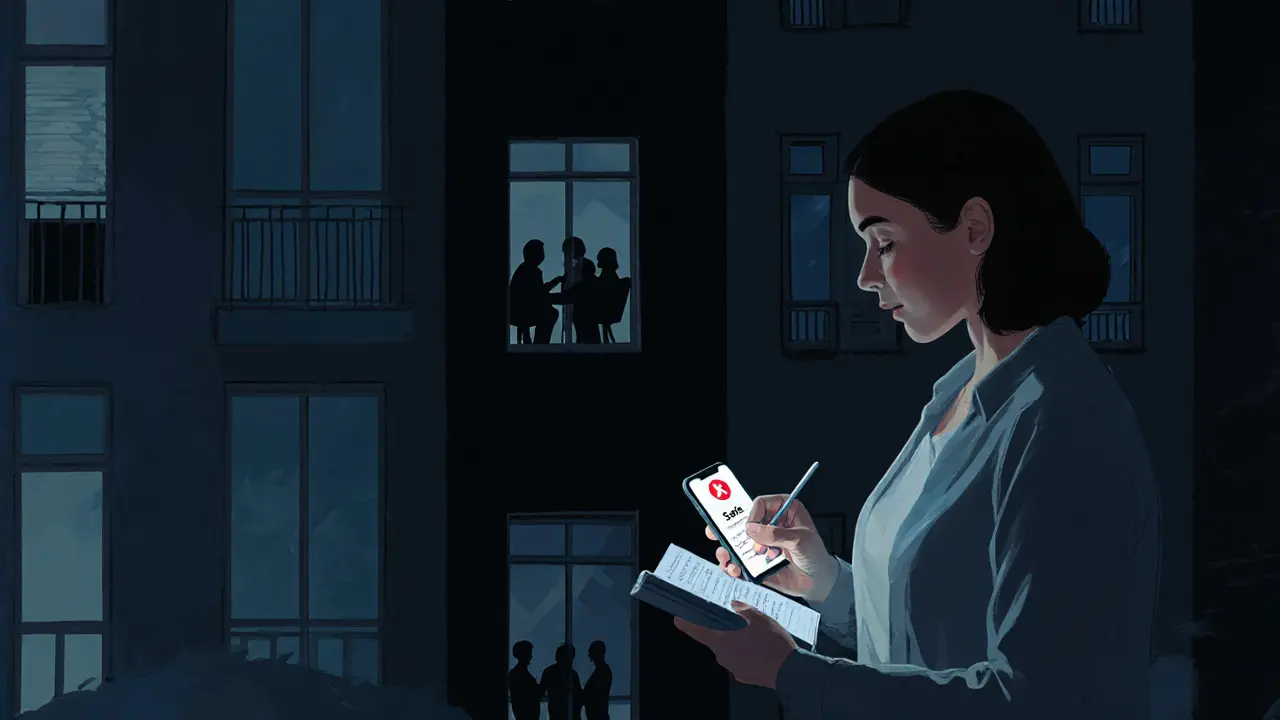Being an escort isn’t just about meeting people-it’s about staying alive. Every time you walk into a hotel room, get into a car, or send a message to a new client, you’re making a risk assessment. No one talks about it enough, but the difference between a safe night and a dangerous one often comes down to a few simple habits. You don’t need fancy gear or a bodyguard. You need a system.
Screen Clients Before You Agree to Meet
Never skip the pre-meet screening. It’s not rude-it’s survival. Ask for full name, phone number, and a clear photo of their face holding a handwritten note with today’s date. If they refuse, walk away. No exceptions. A real client won’t mind. A predator will disappear.
Check their online footprint. Search their name on Google, Facebook, and Instagram. Look for patterns: do they have zero friends? Do they post only about sex work? Are they using fake names? A client who uses the same username across three platforms is easier to trace. One with no digital trace? That’s a red flag.
Use a screening form. Even if it’s just a Google Form with five questions: What’s your full name? Why are you booking? Have you booked with escorts before? What time will you arrive? Will you be alone? If they answer vaguely or avoid the last question, don’t go.
Always Share Your Location and Schedule
Tell someone-anyone-where you’re going and when you’ll be back. It doesn’t have to be a friend. It could be a coworker, a neighbor, or even a safety app linked to a trusted contact. Set a timer. If you don’t check in by the time you said you would, they call the police.
Use a real-time location-sharing app like Life360 or Find My. Don’t just say, “I’m at the Hilton.” Say, “I’m at the Hilton, room 1204, meeting a client named Mark. I’ll check in at 11:30 PM.” Write it down. Send it. Keep a copy in your phone and on a piece of paper in your purse.
Never go to a private home unless you’ve done multiple successful meets with that person. Even then, keep your own key. Never let someone else control the door.
Work in Public First, Private Later
Start every new client with a public meet. Coffee shop. Hotel lobby. A quiet bar with good lighting and exits. Stay there for 15 minutes. Talk. Observe. See how they act when they think you’re not watching. Do they get agitated if you ask for a condom? Do they try to rush you out the door? Do they keep checking their phone like they’re waiting for someone?
Public meets cut your risk by 70%. A 2023 study by the Global Network of Sex Work Projects found that escorts who required a public first meet had far fewer incidents of assault or robbery. It’s not about being cautious-it’s about filtering out the ones who can’t handle boundaries.
If they push back? “I don’t do private meets on the first date.” Say it like you mean it. Say it like you’ve said it a hundred times before. Because you have.

Carry a Personal Alarm and Emergency Contact
Keep a small personal alarm on your keychain. It doesn’t need to be loud-it needs to be loud enough to make someone flinch. Test it every week. Make sure the battery isn’t dead. Keep it in your pocket, not your bag. If things go wrong, you won’t have time to dig for it.
Set up a silent emergency code with a friend. A text that says “How’s the weather?” means you’re in trouble. A photo of a coffee cup means you need help. Make it something normal-looking. No one will suspect it.
Keep your phone charged. Always. Carry a portable charger. If you’re going to be out late, plug it in before you leave. A dead phone is a dead end.
Know Your Legal Rights and Local Laws
Where you work matters. In Bristol, sex work itself isn’t illegal-but soliciting in public, running a brothel, or living off earnings from sex work are. Know what you can and can’t do. Don’t assume the police are on your side. They’re not. But they’re also not your enemy if you know your rights.
If you’re stopped by police: stay calm. Say, “I’m not under arrest, am I?” If they say no, you can leave. If they say yes, ask for a lawyer. Don’t sign anything. Don’t admit to anything. Record the interaction if you can. Most phones can do that.
Join a local sex worker collective. In the UK, groups like the English Collective of Prostitutes offer legal advice, safety training, and peer support. You’re not alone. There are people who’ve been where you are and survived.

Trust Your Gut-Even When It’s Quiet
The most dangerous moments aren’t the loud ones. They’re the ones where everything seems fine. The client who’s polite. The one who tips well. The one who says, “You’re different from the others.” That’s when your body starts to tense up. That’s when your stomach drops. That’s when you feel like you need to leave-but you don’t know why.
Listen to that feeling. Walk out. Say you’re sick. Say you have a family emergency. Say you forgot your wallet. It doesn’t matter what excuse you give. What matters is that you leave.
You don’t owe anyone your safety. Not a client. Not a partner. Not your landlord. Not your boss. Your body is your only asset. Protect it like it’s the last thing you have left.
Build a Support Network-Not Just Clients
Don’t isolate yourself. Talk to other escorts. Swap stories. Share names of bad clients. Celebrate good ones. There’s power in numbers. When one person speaks up, others feel safe to do the same.
Find a therapist who understands sex work. Not one who judges you. One who knows the stress, the trauma, the exhaustion. You don’t need to be broken to need help. You need help because you’re doing hard things.
Keep a list of people you can call at 3 a.m. A friend. A colleague. A hotline. Save them in your phone as “Safe.” Not “Mom.” Not “Dad.” Just “Safe.” So when you’re shaking, you don’t have to think. You just tap.
Review Every Job-Even the Good Ones
After every meet, spend five minutes writing down what happened. Not for a journal. For your safety. Who was there? What did they say? Did they touch you without asking? Did they try to move you to another room? Did they act weird after payment?
Keep a private spreadsheet or notes app. Tag clients: “Safe,” “Red Flag,” “Avoid.” Over time, patterns emerge. You’ll start recognizing the signs before they happen.
Don’t be afraid to blacklist someone-even if they paid on time. If they made you feel small, even once, they’re not worth the risk.
Safety isn’t a one-time decision. It’s a daily practice. It’s showing up for yourself, even when no one else does.
What should I do if a client refuses to use a condom?
Walk away immediately. No negotiation. No exceptions. Condoms aren’t optional-they’re your first line of defense against disease and control. A client who won’t use one isn’t interested in your safety. They’re interested in power. Leave. Report them to your network. Your health isn’t up for debate.
Can I trust a client who says they’re a doctor or police officer?
No. Never. People who claim to be in authority are often trying to manipulate you into lowering your guard. Real professionals don’t hide behind titles. They respect boundaries. If someone says they’re a cop or a doctor, assume they’re lying-and treat them like a threat.
Is it safe to work alone?
Working alone is common-but it’s not safer. If you work alone, you must have a stronger safety system: location sharing, emergency contacts, public first meets, and a reliable way to call for help. Never work alone if you’re new, tired, or emotionally drained. Take a night off. Your safety is more important than any payment.
How do I handle a client who becomes aggressive?
Stay calm. Don’t argue. Don’t fight. Say, “I’m leaving now,” and move toward the door. If they block you, use your alarm. Shout. Draw attention. Your goal isn’t to win-it’s to escape. Once you’re out, call your emergency contact and report the incident. Save their details. Share them with others. Silence protects predators. Your voice protects others.
Should I use a fake name?
Yes. Always. Use a professional name that’s not linked to your personal life. Don’t use your real address, phone number, or social media. Create a separate email and phone line just for work. Your personal identity is your shield. Keep it separate from your work identity.
What apps are safe for booking clients?
Avoid public platforms like social media or dating apps. Use dedicated escort platforms like Eros or The Erotic Network, where clients are vetted and reviews are visible. Even then, screen every client. No platform is foolproof. Your judgment is your best tool.
Can I report a bad client without getting in trouble?
Yes. You can report threats, assault, or harassment to the police without being arrested for sex work. In the UK, the Crown Prosecution Service has guidelines to protect sex workers who report crimes. Focus on the crime-not your work. Say, “I was threatened,” not “I was working.” You have rights. Use them.








7 Comments
akash gupta
October 31, 2025 AT 13:46Screening clients is non-negotiable. If they won’t give you a photo with today’s date, they’re not legit. I’ve seen too many girls get taken out because they skipped this step. Google their name, check their socials-zero friends + same username across platforms = predator. No exceptions. Your life > their ego.
Albert Sarvis
November 1, 2025 AT 02:54Thank you for this comprehensive, life-saving guide. Every single point here is grounded in reality, not theory. As a professional in the field of public safety, I can confirm: structured protocols reduce risk exponentially. You are not being paranoid-you are being prudent. Keep advocating for these practices. The world needs more clarity, not stigma.
becky cavan
November 2, 2025 AT 06:51Public first meet. Always. No exceptions. Done.
Joel Barrionuevo
November 3, 2025 AT 12:00I think the real issue here isn’t just the tactics-it’s the isolation. We’re taught to handle this alone, like it’s some private burden. But safety isn’t a solo act. It’s communal. The fact that you mention collectives and peer networks? That’s the quiet revolution. When one person speaks up, others find their voice. That’s how change happens-not through laws, but through trust. You’re not just listing steps. You’re building a culture of care.
Devin Payne
November 5, 2025 AT 04:09‘Walk away immediately.’ You say that like it’s simple. But you didn’t mention the legal gray zones. In 37 states, even mentioning condom use can be construed as solicitation evidence. And you call that ‘survival’? You’re glorifying risk. If you’re going to do this, at least follow the law. And stop using ‘they’ as a singular pronoun-it’s grammatically indefensible. Also, ‘no exceptions’ is not a legal defense. You’re giving bad advice wrapped in emotional language.
Conor Burke
November 6, 2025 AT 14:36While the intent behind this post is commendable, several grammatical inconsistencies undermine its authority. For instance, the phrase ‘You don’t need fancy gear or a bodyguard. You need a system.’ lacks parallel structure-‘a system’ should be preceded by ‘fancy’ for symmetry. Additionally, the use of em dashes without spaces before and after is typographically incorrect. And ‘No one talks about it enough’-a dangling modifier if ever there was one. Proper English matters, especially when lives are at stake.
Melissa Garner
November 8, 2025 AT 11:21THIS. IS. EVERYTHING. 🙌🔥 I’ve been doing this for 8 years and this post just gave me chills. I use Life360, my alarm is on my keychain, and I’ve got a ‘Safe’ contact saved as ‘Mom’ so I don’t freak out when I need to call. You’re not alone. We got you. 💪❤️